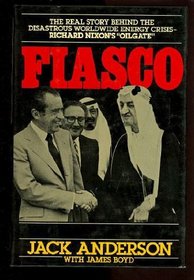Search -
Fiasco
Fiasco
Author:
"A world-upending revolution, wholly triumphant because wholly unopposed and wholly acquiesced in, had placed in the hands of surprised OpEC regimes the power to reduce oil output below normal demand, which quickly became power to raise prices to whatever level the panicked bidding of a leaderless, oil-dependent West would bear." — The syndicated... more »
Author:
"A world-upending revolution, wholly triumphant because wholly unopposed and wholly acquiesced in, had placed in the hands of surprised OpEC regimes the power to reduce oil output below normal demand, which quickly became power to raise prices to whatever level the panicked bidding of a leaderless, oil-dependent West would bear." — The syndicated... more »
ISBN-13: 9780812909432
ISBN-10: 0812909437
Publication Date: 10/1983
Pages: 386
Rating: 2
ISBN-10: 0812909437
Publication Date: 10/1983
Pages: 386
Rating: 2
4 stars, based on 2 ratings
Genres:





